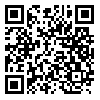Volume 9, Issue 2 (volume9, Issue 2 2021)
CPJ 2021, 9(2): 1-15 |
Back to browse issues page
Download citation:
BibTeX | RIS | EndNote | Medlars | ProCite | Reference Manager | RefWorks
Send citation to:



BibTeX | RIS | EndNote | Medlars | ProCite | Reference Manager | RefWorks
Send citation to:
rezvani S, sharifi A A, Zare H. The effectiveness of cognitive rehabilitation on improving working memory of adolescents with brain injury. CPJ 2021; 9 (2) :1-15
URL: http://jcp.khu.ac.ir/article-1-3397-en.html
URL: http://jcp.khu.ac.ir/article-1-3397-en.html
Payame Noor Universtiy , aliakbarsharifi@pnu.ac.ir@gmail.com
Abstract: (8274 Views)
The aim of this study was to evaluate the effectiveness of cognitive rehabilitation on improving working memory of adolescents with traumatic brain injury. The method of this research was quasi-experimental pre-test-post-test with control and follow-up groups. To conduct this study, 20 adolescents aged 9-18 years with traumatic brain injury referred to medical centers in Sadaf Shahriar (Parandmehr Clinic) were selected by convenience sampling and randomly assigned to two groups of 10 experimental and control. To measure the dependent variable of working memory, Wechsler scale 4 subtests (auditory measurement of working memory) and Benton test (visual-spatial measurement of working memory) were used. The experimental group underwent cognitive rehabilitation intervention (12 sessions of 45 minutes). Analysis of variance with repeated measures was used to analyze the data. The results showed that there was a significant difference between the experimental and control groups in pre-test, post-test and follow-up of working memory performance. The results showed a significant difference between the mean scores of working memory (auditory and visual-spatial measurements) of the experimental group and the control group in the post-test. In addition, there was no significant difference between post-test scores and follow-up in the experimental group, which showed the effect of cognitive rehabilitative perstability on working memory performance in adolescents with brain injury. Therefore, cognitive rehabilitation has a significant effect on improving working memory performance in patients with brain injury and can be used as an effective and useful method to improve working memory performance in adolescents with brain damage.
Type of Study: Research |
Subject:
psychology of human behavior
Received: 2021/03/2 | Accepted: 2021/07/7 | Published: 2021/08/15
Received: 2021/03/2 | Accepted: 2021/07/7 | Published: 2021/08/15
Send email to the article author
| Rights and permissions | |
 |
This work is licensed under a Creative Commons Attribution-NonCommercial 4.0 International License. |






